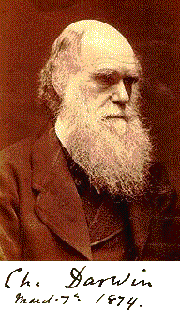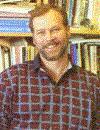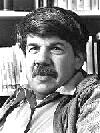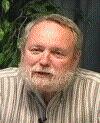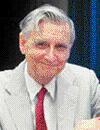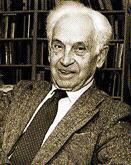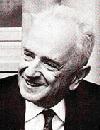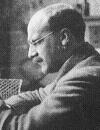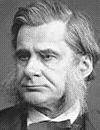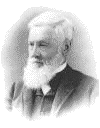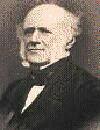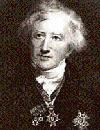|
Discourse on the Revolutionary Upheavals on the Surface of the Globe : And on the Changes Which They Have Produced in the Animal Kingdom.
Cuvier's Elegy of Lamarck : [delayed publication 1835]

 William Smith — 1769-1839
William Smith — 1769-1839
William "Strata" Smith, a civil engineer and surveyor, was well acquainted with areas in southern England where "limestone and shales are layered like slices of bread and butter." His hobby of collecting and cataloging fossil shells from these rocks led to the discovery that certain layers contained fossils unlike those in other layers. Using these key or index fossils as markers, Smith could identify a particular layer of rock wherever it was exposed.
|
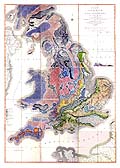

Strata Identified by Organized Fossils : [1816-1819]. A facsimile edition in four parts with explanatory notes.
Because fossils actually record the slow but progressive development of life, scientists use them to identify rocks of the same age throughout the world. See more information about "Strata" Smith and his original geologic map of England. Information about Simon Winchester's delightful biography of Smith, The Map That Changed the World is available at amazon.com. Click on this map to see a larger versions of each of its 15 segments.
|
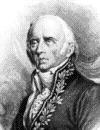
 Jean-Baptiste Lamarck — 1744-1829
Jean-Baptiste Lamarck — 1744-1829
Known primarily for his rejected concept of the inheritance of acquired characteristics, Lamarck was, nevertheless, one of the most important scientists of his day. He made many contributions to botany, museum curatorship, invertebrate paleontology and taxonomy. His concept of acquired characteristics was in part adopted by Darwin and retained followers within science up to the 1930s, until set aside by discoveries in genetics.
|
|
Zoological Philosophy [1809]. Of the considerations relevant to the natural history of animals; to the diversity of their organic structure and of the faculties which they derive from it; to the physical causes sustaining life in them and producing the movements which they carry out; finally, to those causes which produce feeling in some and intelligence in others endowed with it.
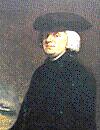
 William Paley — 1743-1805
William Paley — 1743-1805
For many years Paley's writings in moral and political philosophy served as the basic texts and doctrines at Cambridge University. All students had to read them and Darwin was no exception. Paley's analogy of the watch requiring a watchmaker remains the central tenet for those who claim evidence of design in nature (the Intelligent Design movement). Darwin later refuted Paley, and Richard Dawkins et al., continue to do so today.
|
|
Natural Theology : or, Evidences of the Existence and Attributes of the Deity [12th ed. 1809]. Downloadable text file. Darwin was, during his university years, a student of Paley writings, and much of what Darwin later wrote refuted this work by demonstrating the haphazard and contingent nature of evolution.
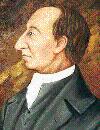
 James Hutton — 1726-1797
James Hutton — 1726-1797
A Scottish geologist and naturalist, Hutton is recognized as the originator of one of the fundamental principles of geology, that of uniformitarianism, which explains the features of the Earth's crust by means of natural processes operating over geologic time. Hutton's 1785 publication led, within just a few decades, to the almost total abandonment of the concept that the Earth was formed just a few thousand years ago.
|
|
Theory of the Earth Or an Investigation of the Laws Observable in the Composition, Dissolution, and Restoration of Land upon the Globe [1785]. When we trace the parts of which this terrestrial system is composed, and when we view the general connection of those several parts, the whole presents a machine of a peculiar construction by which it is adapted to a certain end. We perceive a fabric, erected in wisdom, to obtain a purpose worthy of the power that is apparent in the production of it.

 Gilbert White — 1720-1793
Gilbert White — 1720-1793
In the tradition of science in his time, Gilbert White was a clergyman in the Anglican Church of England. Education in natural history was a normal part of the education of those persons destined to take holy orders, and much of what we think of as published science in that era was the recording by clergymen of observations made in geology and field biology. White's Natural History of Selborne is a classic of the genre.
|
|
The Natural History and Antiquities of Selborne : London, B. White and Son. 468 pp., [1789].
The bulk of the work is composed of a series of letters sent to two sponsors over a period of many years.
|
Collections of Essays and Books
|
|
|
Early Classics in Biogeography, Distribution, and Diversity Studies : Up to 1950, a collection of essays that may be difficult to find elsewhere. A number of them are listed here, but there are many more.
50th Anniversary Collection : Essays about On the Origin of Speces [1909]. They cover a wide range of topics and were contributed by 25 leading scientists of the period.
| | | | |
